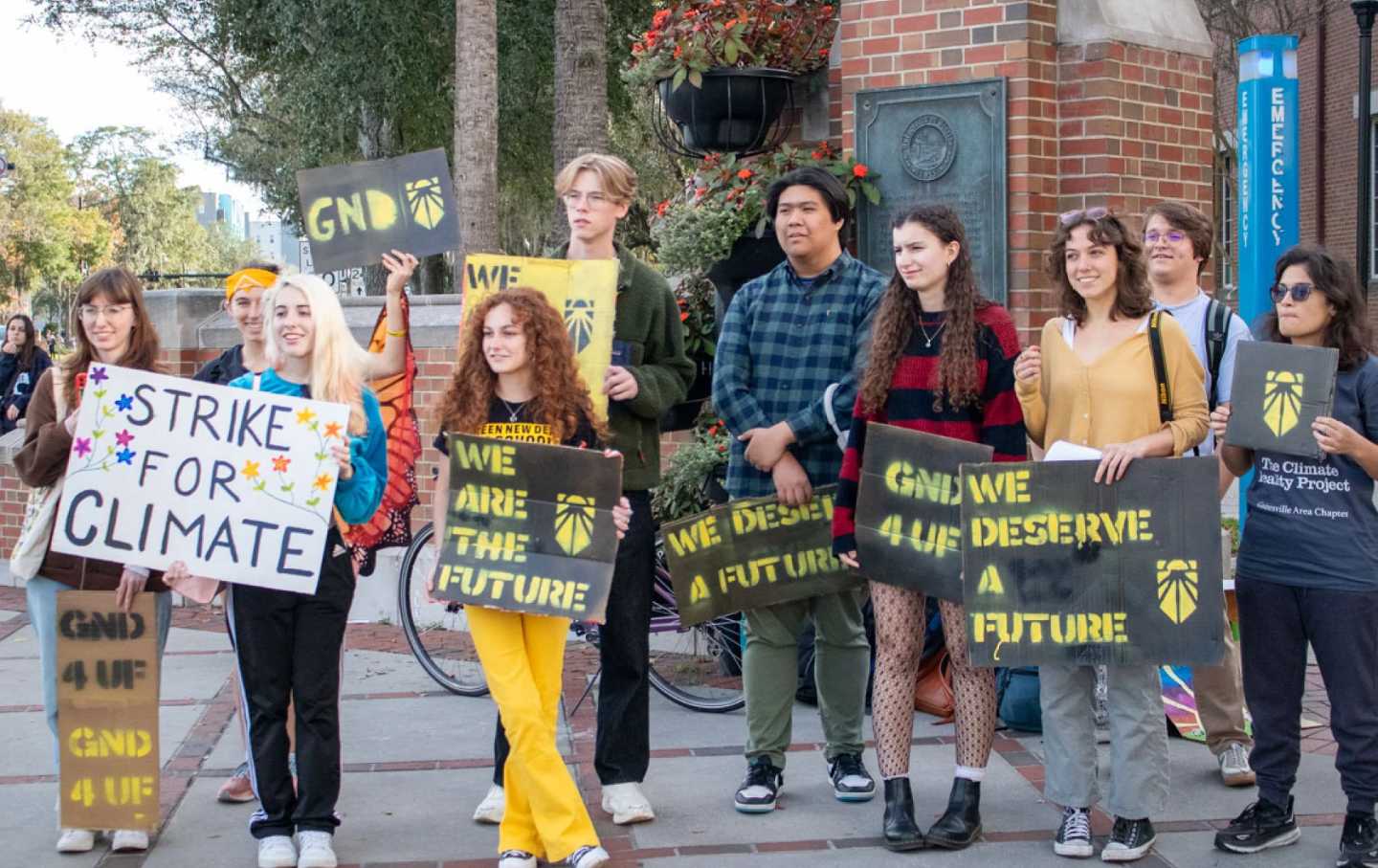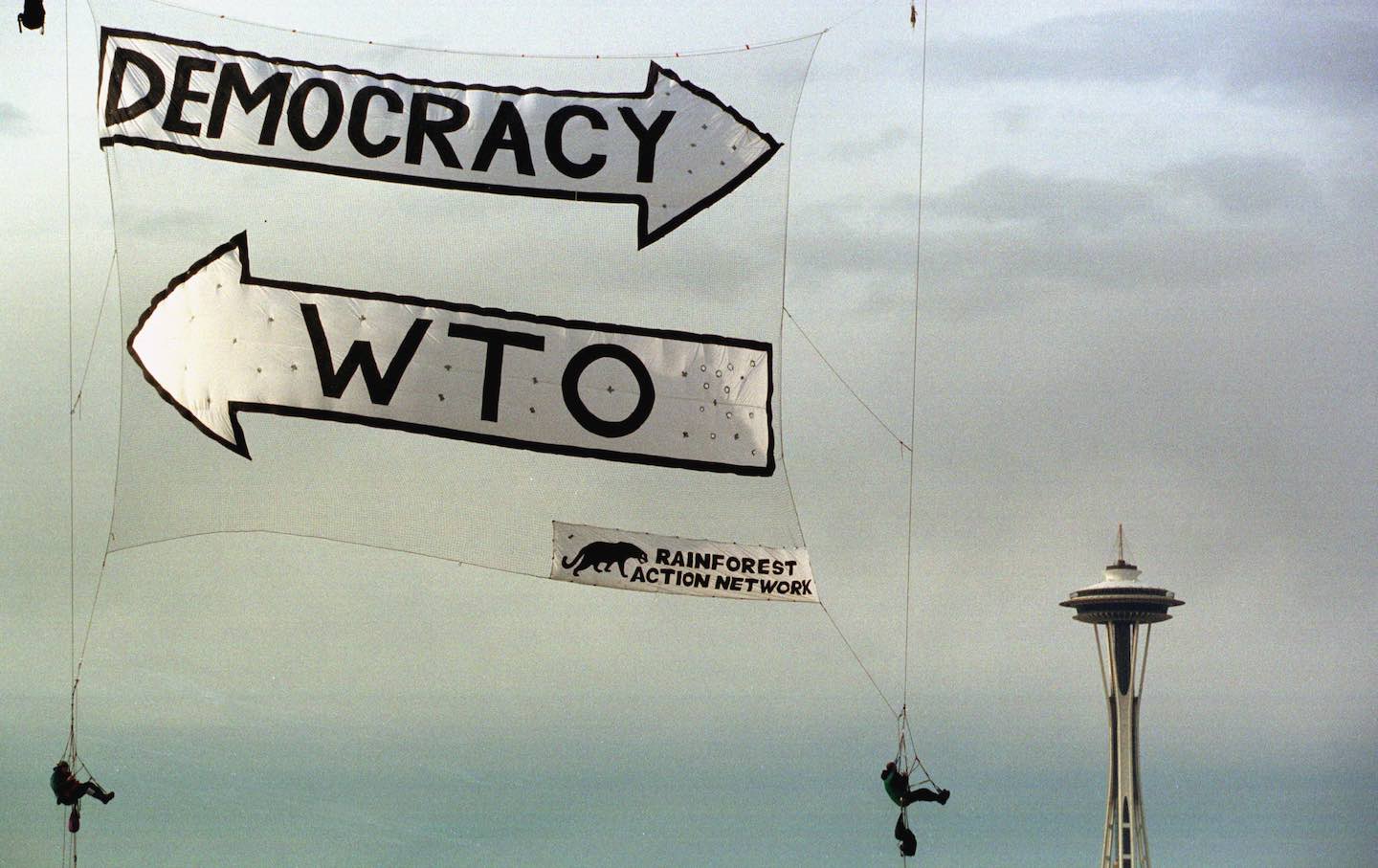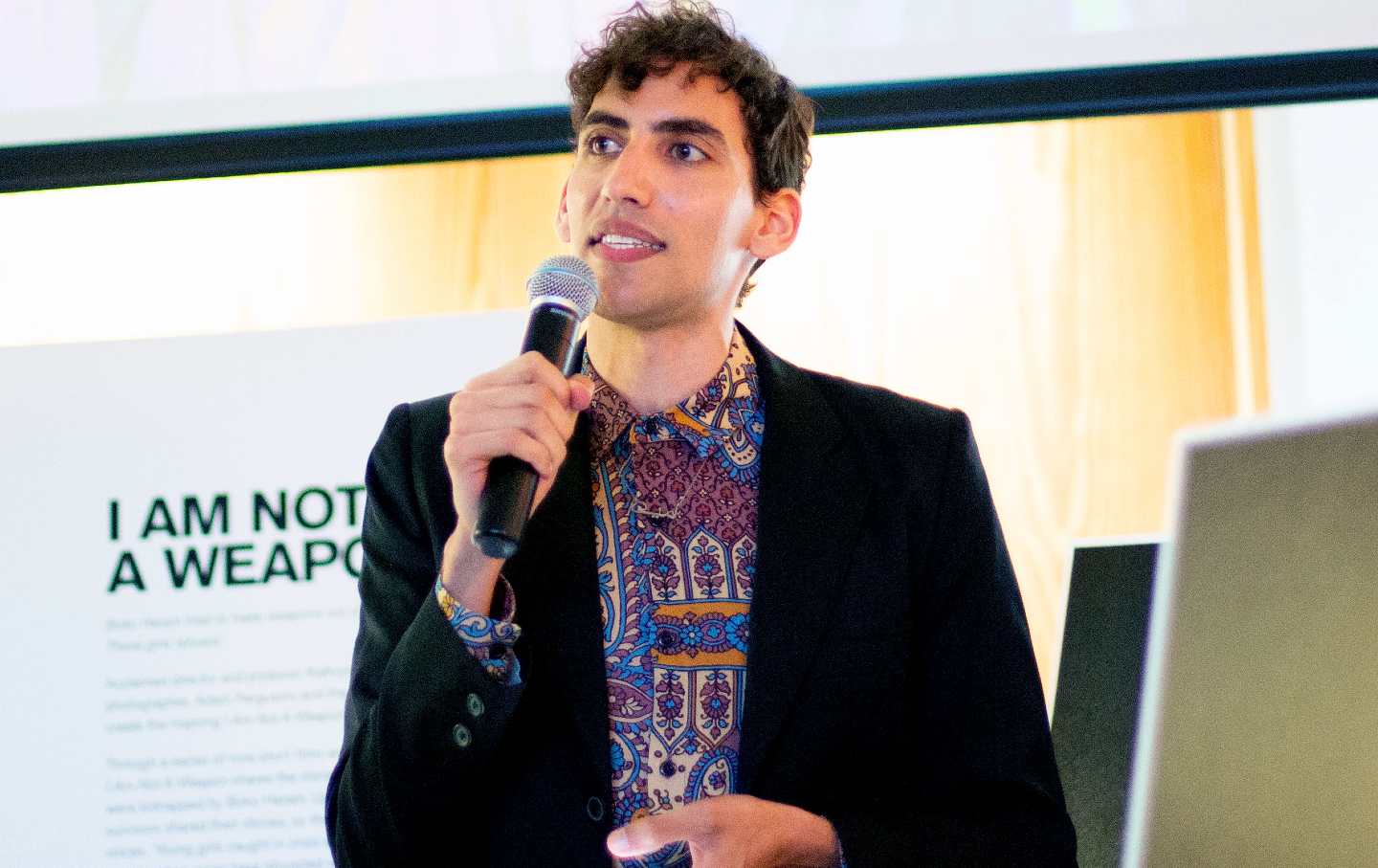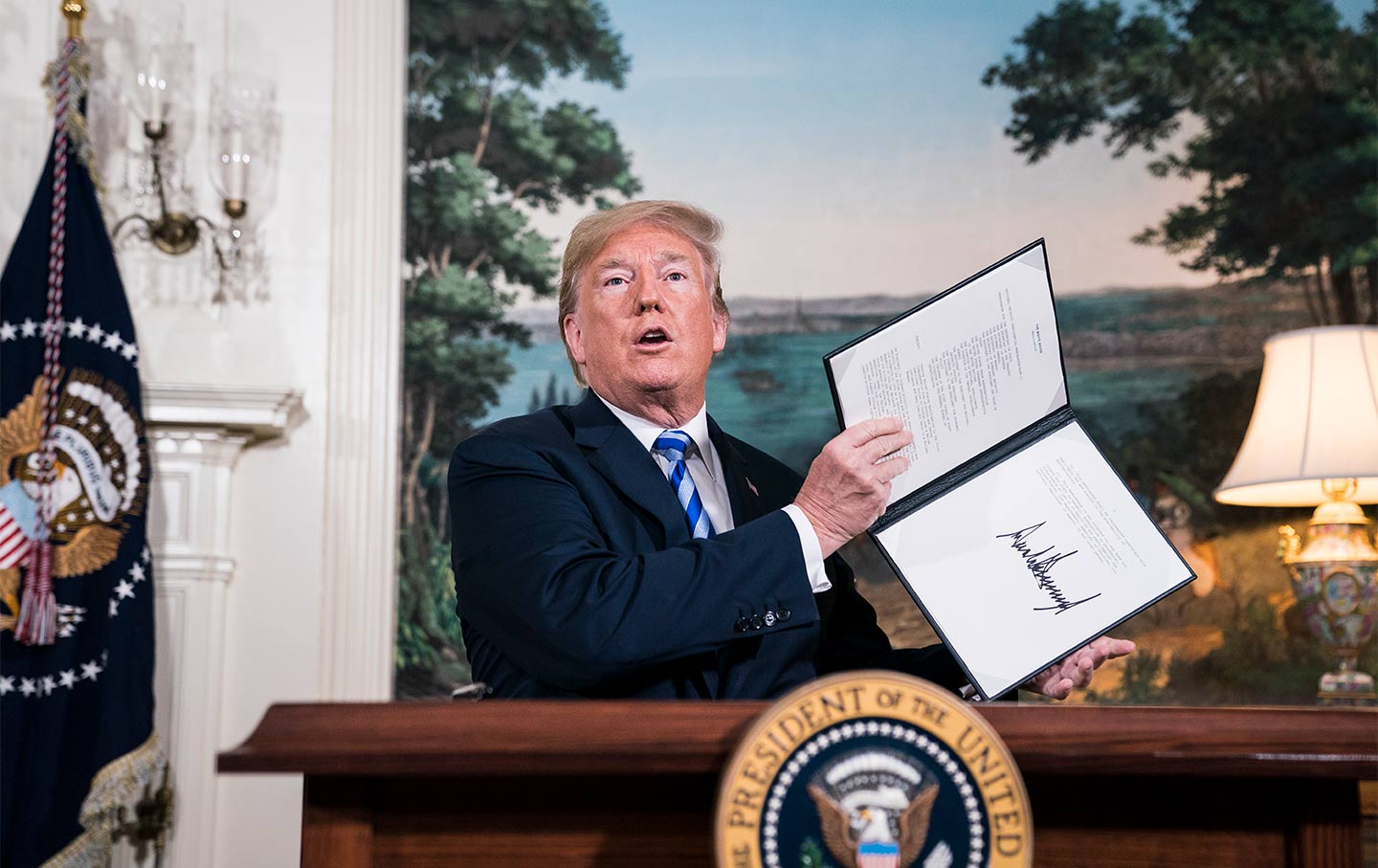Students at the University of Florida Passed a Historic Pledge for a Green New Deal
UF is the first and only public university whose student government has given a direct mandate for a Green New Deal. Here’s what happens next.

An event by the Green New Deal for UF Coalition on the University of Florida campus.
(Green New Deal for UF Coalition)On February 20, the student government of one of the largest universities in the United States unanimously passed a first-of-its-kind Green New Deal resolution, calling for sweeping on-campus decarbonization, complete divestment from the fossil fuel industry, and restorative justice for marginalized communities most affected by the climate crisis.
You might assume that this happened at one of the recognizably liberal-minded Ivy League schools in the Northeast, or perhaps within the climate-oriented University of California system. You would be wrong.
The resolution was passed at the University of Florida, one of the prime targets of Governor Ron DeSantis’s hostile takeover of higher education, where we successfully lobbied 100 elected student senators to call for a Green New Deal. In doing so, we made history. UF has become the first and only public university whose student government has given a direct mandate for a Green New Deal.
Our five-volume resolution outlines a comprehensive policy platform for climate sustainability at the university, which was drafted with input from students, faculty, and impacted communities with the goal of eventual adoption by UF.
Volume one demands the implementation of the Office of Sustainability’s updated Climate Action Plan 2.0, which would enact UF’s rapid transition to carbon neutrality through a wide array of measures that would decrease emissions and increase resource efficiency. Volume two directs UF administration to increase transparency surrounding its financial ties to the fossil fuel industry, which certainly exist yet are not disclosed publicly. Volume three calls for complete divestment from fossil fuel companies and other exploitative industries. Volume four demands the prohibition of UF faculty and research teams from accepting financial contributions from the fossil fuel industry to fund their research. And Volume five centers on including the voices of historically marginalized and Indigenous communities in executing climate mitigation measures to ensure a just transition.
In August of 2023, our freshmen year, the two of us met for breakfast in Gainesville. We had been inspired by the news that NYU would entirely divest from fossil fuels and were puzzled by the fact that similar organizing hadn’t begun in Florida, which is among the states most impacted by the climate crisis. Although UF was once a pioneer in climate advocacy, launching one of the first climate action plans in 2006, the new university administration led by former senator Ben Sasse, a Republican, has failed to adopt the updated Climate Action Plan 2.0 drafted by our Office of Sustainability two years ago.
Some may doubt that this resolution could have a consequential role on climate policy, but the student government at UF is unique in the power it wields within the university itself and across the wider city of Gainesville. The UF Student Senate allocated $23 million in discretionary funding for the 2023–24 school year; a similar amount is expected next year. This budget gives the UF student government free rein to invest in sustainable retrofitting of campus facilities and services. In addition, the student body president (who also sponsored the resolution) has voting power on UF’s Board of Trustees and can give input over the university’s fiscal policy.
The student government’s decision was felt well outside of UF itself. In the days following the passage, the county of Alachua’s commission endorsed our effort by penning a letter that asked university administration to adopt key planks of the Green New Deal for UF. Students at other universities nationwide like the University of North Carolina–Chapel Hill, Florida State University, Florida Atlantic University, and more have responded by organizing GND campaigns on their own campuses.
This development is not just another notch for the growing climate movement to put under its belt; it also unambiguously bears out existing polling data regarding the Green New Deal’s overwhelming popularity with young people. For example, Data for Progress recently found that support for the Green New Deal among those 45 and younger stands at 69 percent.
UF is one of the largest public universities in the country, with just over 60,000 enrolled students and an exceptionally diverse student body—demographically, economically, and educationally. Our fight was led not by a niche collection of environmental studies majors but by a broad coalition of ordinary students who simply want a livable future. The Green New Deal for UF coalition includes a dozen student organizations, including environmental groups, advocacy organizations, community service clubs, and established cultural associations like UF’s Pride Student Union.
Our path forward is clear, but it will not be easy. A recent presentation of the resolution to the Board of Trustees was met with thunderous applause by students, faculty, and community members who took time out of their day to show up in support of the Green New Deal for UF, but this support was not reciprocated by the trustees themselves. Our university’s supreme governing authority is made up of individuals who have collectively donated more than a million dollars to a PAC that supports climate deniers like Ron Desantis. And unlike other universities where students have successfully won concessions from their administrations, we can not take for granted that our leaders even recognize climate change as a serious problem.
Fortunately, the Green New Deal for UF is not in the hands of one person or authority—like the board of trustees—but of llseveral decision-makers in various positions within the university that have jurisdiction over specific volumes of the resolutions. These would include many vice presidents within President Sasse’s cabinet, many of whom have been in their positions since long before Sasse and may not necessarily subscribe to his conservative view on an issue so thoroughly advocated by the scientific community at UF and beyond.
Other legislative bodies like the UF Faculty Senate offer additional avenues to pressure the administration. We are currently working with several faculty senators to pass a companion resolution, which would further cement the GND for UF as a proposal with salience across the university. Evidently, our approach involves individual campaigns to force movement from these leaders one approval at a time.
Our clean research campaign, for example, involves securing pledges from individual professors to refuse financing from the fossil fuel industry to fund their research. In this way, we will force the industry to disentangle from UF’s research apparatus without needing an official ban from the vice president of research. Naturally, our first 10 pledges have come from within UF’s sustainability studies and climate science programs, but we intend to extend this request to all UF faculty members.
Popular
“swipe left below to view more authors”Swipe →Our multipronged strategy, which aims to win important policy concessions by applying pressure on every gear of our university’s vast bureaucracy, is designed to combat structural climate apathy, especially within an institution firmly under the guise of culture war politics.
However, the most important revelation from the passage of a GND for UF resolution is that youth activism has not been extinguished by Governor DeSantis’s crackdown. If anything, we have proved that his policies only serve to reinvigorate college organizers leading the fight for progressive policy issues while other organizations abandon our state. Whether in conventionally blue states or red states, the march toward climate justice will continue.
More from The Nation

The “Save Chinatown” Coalition Goes on the Defensive in Philadelphia The “Save Chinatown” Coalition Goes on the Defensive in Philadelphia
The construction of a new basketball arena threatens to fill the neighborhood with more traffic and raise rents.

Human Rights for Everyone Human Rights for Everyone
December 10 is Human Rights Day, commemorating the anniversary of the Universal Declaration of Human Rights (UDHR), one of the world's most groundbreaking global pledges.

25 Years Ago, the Battle of Seattle Showed Us What Democracy Looks Like 25 Years Ago, the Battle of Seattle Showed Us What Democracy Looks Like
The protests against the WTO Conference in 1999 were short-lived. But their legacy has reverberated through American political life ever since.

Hollywood’s Vocal Actors Union Goes Silent on a Gaza Ceasefire Hollywood’s Vocal Actors Union Goes Silent on a Gaza Ceasefire
Amin El Gamal, head of SAG-AFTRA's committee on Middle Eastern and North African members, has advocated for a statement supporting a ceasefire in Gaza—so far without success

The Mirabal Sisters The Mirabal Sisters
Patria, Minerva, and María Teresa Mirabal were sisters from the Dominican Republic who opposed the dictatorship of Rafael Trujillo; they were assassinated on November 25, 1960, und...

What Will a Peace Movement Look Like Under Trump’s Second Presidency? What Will a Peace Movement Look Like Under Trump’s Second Presidency?
An all-hands-on-deck approach to the coming world of Donald Trump and crew is distinctly in order.


